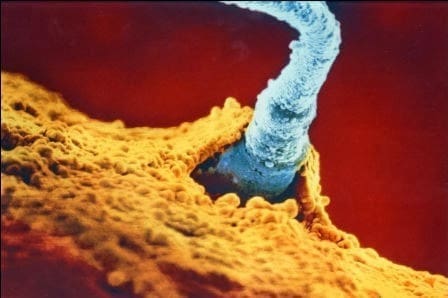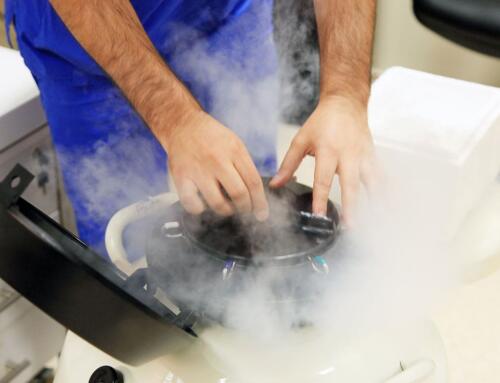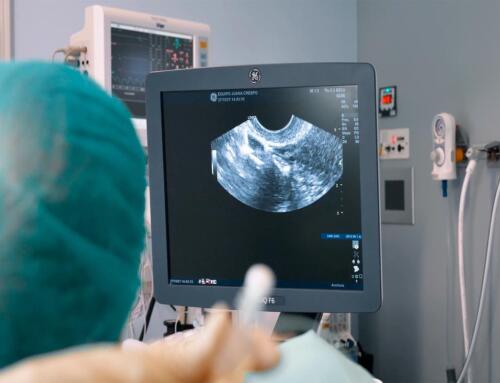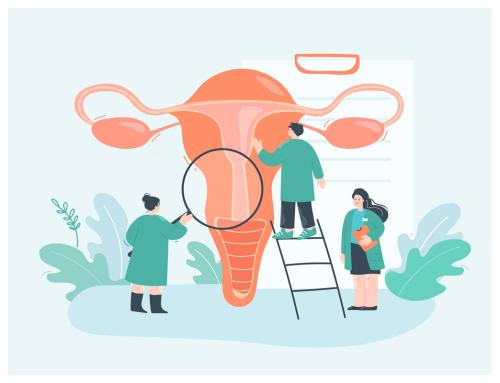.
Fertility problems are not exclusive to women. Despite being an obsolete belief, we still see how the information and pressure to have a baby continues to focus, especially on women. This causes male infertility to remain in the background. And also, there is still a great lack of knowledge about the fertility problems that can affect men.
However, the figures speak for themselves.
The male factor is directly implicated in 47% of cases of sterility, which is the inability to conceive. And in cases of infertility, i.e. the difficulty in having children, 30% of them have their origin in men, mainly due to the seminal factor. More specifically, in most cases, it is due to the low number of spermatozoa.
For all these reasons, when couples come to our clinic with problems to conceive, we perform fertility studies on both members of the couple. In case of diagnosing fertility problems in a man, we have our own Andrology laboratory, as well as a Urology Unit specialized in male infertility.
Fortunately, nowadays we have very effective treatments to solve male infertility problems. Do you want to know which are the most advanced and effective solutions? Read on and find out how in Juana Crespo we treat all possible prostate, urinary and hormonal pathologies that can affect male fertility.
What is male infertility?
Male infertility is considered so when a man is unable to impregnate a woman after trying for at least one year.
Although there are other pathologies associated with male infertility, it depends mainly on the quantity and quality of the sperm. If the quantity of sperm that the man ejaculates is scarce or if the sperm is of poor quality, he may have difficulty in achieving a natural pregnancy. Sometimes it may even be impossible.
What are the causes of male infertility?
There are several factors that affect male infertility. Some of these are:
– Retrograde ejaculation.
This is a disorder in which the semen, instead of being expelled through the penis, is directed through the urethral duct into the bladder. This problem may be related to diabetes, the use of certain medications, or as a result of recent surgery on the bladder, prostate or urethra.
-Hormonal problems
Some pituitary or thyroid problems, among others, may be behind many cases of male infertility.
-Autoimmune problems
In men with certain autoimmune problems, the immune system itself may accidentally eliminate the spermatozoa, since it recognizes them as a virus that it is trying to eliminate. As a result, sperm quality may be affected.
-Varicocele
Varicoceles are dilatations of the veins in the scrotum that increase testicular temperature. This condition occurs in 40% of infertile men.
-Genetic diseases
Some genetic diseases, such as cystic fibrosis, may be one of the causes of male infertility.
-Congenital defects, blockages or physical damage.
Infertility can occur in men who were born with blockages in the seminal ducts or other abnormalities that prevent sperm from reaching the semen. Physical trauma to the testicles, urethra or prostate may also prevent fertility.
-Sexually transmitted infections
Some sexually transmitted diseases, such as chlamydia or gonorrhea, can cause male infertility. However, in most cases, this problem is relatively easy to resolve with proper treatment of the infection.
-Environmental factors
Exposure to pesticides, radiation to mercury or heavy metals, consumption of medication for alopecia, for example, can reduce sperm quality.
-Age
As with women, age also influences sperm quality. Over the years, not only does the fertilization capacity of the sperm decrease, but also the damage to the genetic material contained in the sperm increases and can be the cause of hereditary diseases.
-Lifestyle habits
Poor diet, excessive physical exercise, as well as the opposite, obesity and a sedentary lifestyle can affect the quantity and quality of sperm. Stress, tobacco and alcohol consumed regularly can also lead to fertility problems.
How to detect male infertility
In addition to not being able to achieve pregnancy, there are some signs that you can have male infertility. The most prominent is suffering from some type of sexual dysfunction. Thus, if there is a problem ejaculating, there is a decrease in ejaculated fluid, erectile dysfunction, etc., these symptoms (although not always) could be a clear indication that there is a male infertility problem.
Therefore, if pregnancy does not occur, the most appropriate thing to do is to see a specialist to perform the necessary tests to diagnose male infertility.
In Juana Crespo we begin the study of male infertility, and also female infertility, with an initial consultation as an interview in which we investigate the lifestyle, family history, medical tests, etc.. In this way, we will determine which tests will be necessary for an accurate diagnosis.
Within these diagnostic tests for male infertility are:
Semen study
1-Semogram or spermiogram. This is an essential male fertility test that is very easy to perform. It offers us a lot of information and guides us to request complementary tests if necessary. If you want to know how this test is performed, we invite you to read our article “Seminogram: how and why it is performed”.
2-REM. The Motile Sperm Recovery test is a technique that allows processing a semen sample and selecting the most motile and suitable spermatozoa.
3-DNA fragmentation study.
4-Semen culture.
Urological examination
The exploration of the andrologist is very important in men who have seminal or functional alterations. In this way, we determine which techniques are the most appropriate to improve the situation. Sometimes assisted reproduction treatments are involved, but sometimes the results can be improved without resorting to this type of treatment.
Genetic and chromosomal studies
1-Karyotype in peripheral blood.
2-Study of microdeletions of the Y-chromosome, if indicated.
As you can see, the causes of male infertility are many and so are the tests to diagnose it. For this reason, “at Juana Crespo we do not start a treatment based solely on the semen analysis, but we develop a complete study of the male’s health with the aim of avoiding assisted reproduction treatments that may be unnecessary or, even worse, ineffective” explains Dr. Elena Pau, gynecologist at Juana Crespo.
How to deal with male infertility in assisted reproduction
Nowadays, at Equipo Juana Crespo we offer couples a series of treatments related to assisted reproduction in order to achieve the desired pregnancy. Of course, the treatment will depend on the problem that is causing the infertility and, sometimes, they can even be preventive treatments. Some of these main treatments are:
Vitrification or sperm freezing
This is a mainly preventive technique that consists of freezing the spermatozoa for later use in an assisted reproduction treatment. It is a particularly useful technique for those men who are planning to undergo any therapy or aggressive treatments that may damage their sperm.
MACS
It is a technique that allows the recognition of spermatozoa with fragmented DNA, allowing them to be separated from healthy spermatozoa.
Fertile Chip
It is an advanced sperm selection technique that allows us to separate those spermatozoa with better motility and morphology, and less double-stranded DNA fragmentation.
Epididymal aspiration
It is a technique that allows us to remove a sample of sperm from the epididymis through a small needle for later use in IVF. Sperm aspiration can be useful for men who have infertility problems caused by a blockage that prevents sperm from ejaculating. This could be due to a previous vasectomy, certain genetic conditions, infections or other pathologies.
Testicular biopsy
This technique is performed in the operating room and allows direct access to the man’s testicle to extract his sperm.
Classic IVF
A percentage of sperm is placed in a Petri dish next to the oocyte in order to wait for a natural fertilization. We must have a good semen sample for this purpose.
ICSI
Intracytoplasmic microinjection, ICSI, is the IVF technique that allows the direct union of the egg and the sperm, since it is the embryologist who injects the selected sperm into the egg, facilitating its fertilization. This is a technique with a high success rate in male infertility.
Sperm Donation
If it is totally impossible to obtain a sperm sample from the male, it is possible to resort to the use of donor sperm. Nowadays, thanks to the aforementioned techniques and the experience of the Andrology Unit team, resorting to donor sperm occurs in few situations.
A different way to treat male infertility.
In the Juana Crespo Team we are specialists in male infertility treatments. Our Andrology Unit is especially distinguished by its diagnostic capability. Thanks to the application of the most advanced techniques, we can evaluate the functionality of the spermatozoa and select only those spermatozoa that are optimal and free of genetic abnormalities.
In addition, the complete study of male health allows us to treat all possible prostate, urinary and hormonal pathologies that may compromise male fertility.
In addition to applying techniques that require great preparation and experience,” explains Dr. Elena Pau, “the impeccable work of our andrologists allows us to avoid resorting to donor sperm, which, at Equipo Juana Crespo, is almost anecdotal. This makes it possible for our patients to achieve the ultimate goal of becoming biological parents.”
If you have questions about your fertility or your partner´s, or if you have been diagnosed with male infertility, contact us and book your first appointment on 961 042 557 or through our email: info@juanacrespo.es Detecting male infertility early ensures a better prognosis and a more effective treatment. Why keep on waiting?
.
















